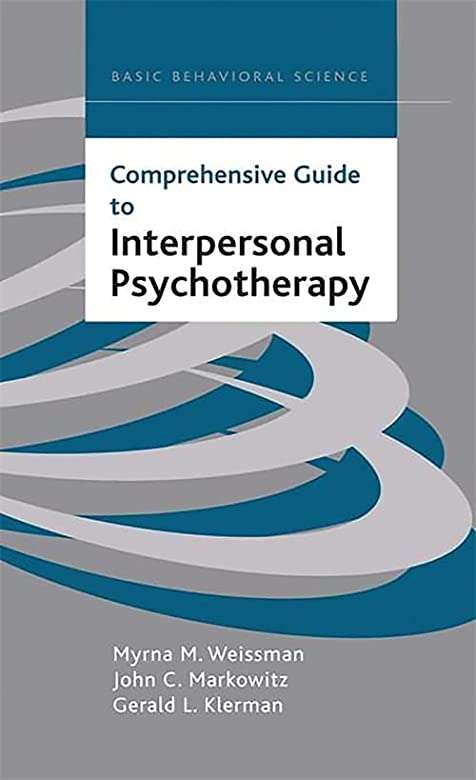Time Limit: IPT was originally conceptualized to be delivered as 12-16 weekly, 45-50 minute, individual sessions. IPT has been tested in an even shorter, 8-session, brief format. In clinical practice, the therapist can adjust the number of sessions to meet the needs of the patient and health care setting, but it is important to define from the outset a discrete time frame for the therapy.
Interpersonal Inventory: The inventory is an extended psychosocial assessment. The therapist carefully reviews the important people in the patient’s life and the quality of those relationships. The therapist seeks to understand the sources of social support, nature of confiding relationships, romantic attachments, interpersonal communication style, and relationship difficulties that may be a cause or consequence of the depressive episode. The therapist uses information from the interpersonal inventory to select the interpersonal problem area.
Interpersonal Problem Areas: In IPT, the therapist selects one of four interpersonal problem areas as the focus for treatment. The four IPT problem areas are:
- Grief or Complicated Bereavement
- Role Dispute
- Role Transition
- Interpersonal Deficits
Grief is chosen as a problem area when the onset or maintenance of the depressive episode is associated with the death of a person close to the patient.
Role Dispute is chosen as a problem area when the onset or maintenance of the depressive episode is associated with an unsatisfying interpersonal relationship characterized by non-reciprocal role expectations between the two parties.
Role Transition is chosen as a problem area when the onset or maintenance of the depressive episode is associated with difficulty coping with changes in current life circumstances. Role transitions may occur in many domains including employment, relationship status, physical health, living conditions, socioeconomic status, etc. The transition is conceptualized as moving from one social role to another social role (i.e., from a student to an employee, from military to civilian status, from single to married, etc.).
Interpersonal Deficits is chosen as a problem area when there is no clear acute interpersonal event associated with the onset or maintenance of the depressive episode and the individual describes a long standing history of impoverished or contentious interpersonal relationships. Although many patients seeking IPT treatment have deficits in interpersonal functioning, the interpersonal deficits category is reserved for cases where no other treatment focus is apparent. Not surprisingly, patients with chronic impairment in social functioning who lack the life events on which IPT focuses fare worse in IPT.
Structured Treatment. IPT has three phases: beginning, middle, and end. The initial phase can last up to three sessions. During that time, the therapist has specific tasks (viz., obtain a psychiatric history and interpersonal inventory, offer a case formulation). The middle phase is focused on resolving the chosen interpersonal problem area in order to improve mood symptoms. The final phase focuses on termination or a “good goodbye.”
Communication Analysis: Communication analysis is used to enhance communication skills and thereby improve interpersonal functioning. In order to dissect in detail the communication between two individuals, the therapist asks for a “movie script” of an exchange between the patient and a significant other, including the setting, content, tone, non-verbal communication, and accompanying emotional experience. The therapist queries the patient about what was intended to be communicated as well as what she thinks was actually communicated. The therapist may then use coaching or role play to help the patient improve her communication skills.
Exploration of Options and Decision Analysis: It is important to ask what the patient she wants in any given situation. Depressed patients often neglect their own needs and desires because they lack energy, motivation, or interest, or feel doing so is “selfish.” Thus, when faced with an interpersonal problem, the therapist asks the patient how she would like to resolve the issue. Depressed patients may initially have difficulty generating options. Therefore, therapists may have to be relatively active at first, helping patients generate a list of potential solutions. After generating options, the patient and therapist evaluate the alternatives to assess how realistic they are. They discuss resources the patient needs to achieve the desired outcome and develop a plan to execute necessary changes. If the patient’s desire is not feasible, the therapist helps the patient mourn the loss of that potential outcome.
Termination: The final phase comprises the last 2-3 sessions of treatment. IPT likens termination to a graduation: the patient has usually made meaningful gains, feels better, and is now ready for something different (i.e., a new treatment, maintenance treatment, no treatment). Thus termination is a role transition from acute therapy. Therapist and patient review the course of treatment, identify treatment gains, and future treatment needs. If the depression has not fully remitted, the therapist blames the treatment rather than the patient and suggests alternative or adjunctive treatments that might address remaining symptoms. The therapist may also identify interpersonal issues that have not been adequately addressed in IPT, such as ongoing marital discord or job dissatisfaction, and perhaps recommend follow-up care for them.
Treatment:
Interpersonal Psychotherapy for Depression
2015 EST Status:
Treatment pending re-evaluation
Very strong: High-quality evidence that treatment improves symptoms and functional outcomes at post-treatment and follow-up; little risk of harm; requires reasonable amount of resources; effective in non-research settings
Strong: Moderate- to high-quality evidence that treatment improves symptoms OR functional outcomes; not a high risk of harm; reasonable use of resources
Weak: Low or very low-quality evidence that treatment produces clinically meaningful effects on symptoms or functional outcomes; Gains from the treatment may not warrant resources involved
Insufficient Evidence: No meta-analytic study could be identified
Insufficient Evidence: Existing meta-analyses are not of sufficient quality
Treatment pending re-evaluation
1998 EST Status:
Strong Research Support
Strong: Support from two well-designed studies conducted by independent investigators.
Modest: Support from one well-designed study or several adequately designed studies.
Controversial: Conflicting results, or claims regarding mechanisms are unsupported.
Strength of Research Support
Empirical Review Status
2015 Criteria
(Tolin et al. Recommendation)
(Tolin et al. Recommendation)
Very Strong
Strong
Weak
Insufficient Evidence
Treatment pending re-evaluation
1998 Criteria
(Chambless et al. EST)
(Chambless et al. EST)
Strong
Modest
Controversial
Find a Therapist specializing in Interpersonal Psychotherapy for Depression. List your practice
Brief Summary
- Basic premise: Depression often follows changes in one’s interpersonal environment (e.g., struggle with a significant other, loss of a loved one). Once depressed, symptoms can lead to compromised interpersonal functioning, which can precipitate continued stressful events. The goal in therapy is to address both the stressful life events and improved social support.
- Essence of therapy: IPT focuses on improving problematic interpersonal relationships or circumstances that are directly related to the current depressive episode.
- Length: Acute IPT for major depression is typically delivered over 12-16 sessions, although courses as short as 3-8 sessions have demonstrated efficacy. Maintenance IPT has been tested in weekly, biweekly, and monthly doses over as long as three years. A briefer, more structured version of IPT, Interpersonal Counseling (IPC), is designed for use primarily in non-mental health settings, such as primary care clinics. IPC is typically delivered in 3-8 sessions.
Note: Interpersonal psychotherapy was developed by Klerman and Weissman for depression and has been expanded for other disorders. A brief history of interpersonal psychotherapy (Weissman, 2006) describes the development of IPT. If you are interested in joining the international IPT organization, contact the IPT Google group.
Treatment Resources
Editors: Rachel Hershenberg, PhD; Young A. Lee, BA
Note: The resources provided below are intended to supplement not replace foundational training in mental health treatment and evidence-based practice
Treatment Manuals / Outlines
Treatment Manuals
Freely available manuals:
- Group IPT for Depression (World Health Organization)
Contact authors of the following manuscripts for these free manuals:
Books Available for Purchase Through External Sites
Note: Interpersonal psychotherapy has been tested in over 90 clinical trials. The manuals describing its procedures are:
Training Materials and Workshops
Training Centers in North America
- Department of Psychiatry, University of Iowa (200 Hawkins Drive, Iowa City, IA 52242); Contact: Scott Stuart, MD and Michael O’Hara, PhD (319-353-6960)
- Department of Psychiatry, Mount Sinai Hospital, University of Toronto (600 University Avenue, 9th Floor, Toronto, ON M5G 1X5); Contact: Paula Ravitz, MD (416-586-4800 x7500)
- Department of Veterans Affairs, Veterans Health Administration, Washington, DC 20420; Contact: National Mental Health Director for Psychotherapy and Psychogeriatric Mental Health Services, VA Central Office (202-461-7304)
Private Training
- Kathleen F. Clougherty, LCSW; Affiliation: New York State Psychiatric Institute and Columbia University; Private Clinic: 345 W 88th Street, New York, NY 10024; Contact: 212-873-4360 or [email protected]
- Helen Verdeli, PhD; Affiliation: Teachers College, Columbia University; Contact: 212-678-3099 or [email protected]
Training Centers in France
- Creatip, Paris, France; Contact: Thierry Bottai; [email protected]; website here
- training in French and English
- 9 Saturdays spread though the year, September to June, additional Fridays for clinical group supervision
- includes many domains of IPT with emphasis on depression, adolescents, andgeriatric patients
- French Speaking Marce Society of Perinatal Psychiatry; Contact: Elisabeth Glatigny; [email protected]; website here
- training in French
- training occurs in a different French city each year and lasts two days
- Dr Antoine Guedeney (Paris) and Dr Anne-Laure Sutter (Bordeaux); Contact: Oguz Omay; [email protected]
- Training in Paris and Bordeaux, France
- Training lasts two days once each year in each location
- Le Teppe Medical Center – Perinatal Psychiatry Unit; Contact: Oguz Omay; [email protected]
- Training occurs in Le Teppe, Tain l’Hermitage, South of France; lasts two days twice a year
- Annual International IPT Workshop in collaboration with International Marce Society, Postpartum Support International, and Le Teppe Medical Center; Contact: Wendy Davis; [email protected]; sign up for September 2015 event here
- Training in French and English; training occurs in Le Teppe, Tain l’Hermitage, South of France
Training Centers in Turkey
- Turkish Society of IPT (KIPT); Contact: Nazan Aydin; [email protected]
- Level A training lasts two days; occurs in Istabul, Ankara, and several other Turkish cities
- Advanced training lasts six days once each year in Istanbul
Training Centers in Japan
- Intro to IPT; website here
- Training occurs in Japanese; trainings occur every three months
Measures, Handouts and Worksheets
- Interpersonal Psychotherapy Outcome Scale (IPOS; Markowitz et al.)
Video Demonstrations
- Psychotherapy Essentials to Go: Interpersonal Therapy (IPT) for Depression (Ravitz, Watson, & Grigoriadis)
Videos Available for Purchase Through External Sites
- Psychotherapy Essentials to Go: Interpersonal Psychotherapy for Depression (Grigoriadis et al.; book and DVD with video descriptions and demonstrations)
Video Descriptions
Videos Available for Purchase Through External Sites
- Psychotherapy Essentials to Go: Interpersonal Psychotherapy for Depression (Grigoriadis et al.; book and DVD with video descriptions and demonstrations)
Clinical Trials
Major Depressive Disorder
Dysthymic Disorder
Maintenance IPT
Group IPT
Interpersonal Counseling (i.e., Brief IPT)




